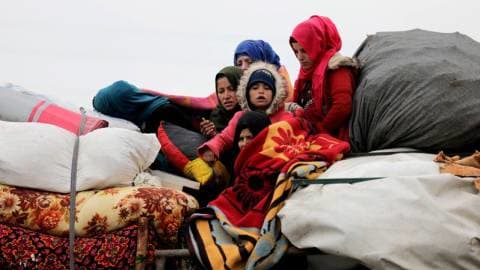
By Tuvan Gumrukcu
ANKARA (Reuters) - Turkey said on Saturday it had fulfilled its responsibilities in Syria's Idlib region in line with de-escalation agreements with Russia and Iran, warning it would take military action in the area if diplomatic efforts with Moscow fail.
Turkey and Russia, which back opposing sides in Syria's war, agreed in 2018 to set up a de-escalation zone in the northwestern region. But their fragile cooperation has been disrupted by a Syrian government offensive in Idlib, in which 13 Turkish soldiers have been killed in the past two weeks.
Ankara has said it will use military power to drive back the Syrian forces unless they withdraw by the end of February, and President Tayyip Erdogan threatened to strike Syrian government forces anywhere in Syria if another Turkish soldier was hurt.
Russia, which backs Syrian President Bashar al-Assad, says Turkey has flouted deals it made with Moscow and aggravated the situation in Idlib. The Kremlin also said Ankara had failed to neutralise militants there.
Turkish Vice President Fuat Oktay told broadcaster NTV that Turkey was determined to stop Syrian advances in Idlib, and that Ankara had conveyed its position to Moscow during ongoing talks.
"We cannot overlook the cruelty happening in our neighbour," Oktay said. "Turkey has fulfilled its responsibilities in Idlib. Some of our observation posts have fallen into areas controlled by the (Syrian) regime," he said, referring to Turkish military observation posts established in Idlib under the 2018 deal.
Foreign Minister Mevlut Cavusoglu said later on Saturday that Turkey wants to resolve matters with Russia over Idlib through diplomacy, but will take other steps if necessary.
"If it won't work through diplomatic channels, we will take the necessary steps," Cavusoglu told reporters at the Munich Security Conference.
He added that a Turkish delegation would go to Moscow on Monday to hold talks over Idlib and that he would meet his Russian counterpart Sergei Lavrov later in the day.
Iran, which also supports Assad, said last week it was ready to help Ankara and Damascus resolve their disputes.
TURKEY-RUSSIA TALKS
The escalation of violence in Idlib has also caused hundreds of thousands of people to abandon their homes and head north to the Turkish-Syrian border, many trudging by foot through snow in freezing temperatures, to escape air strikes and artillery fires by the Russian-supported government forces.
Turkey, which currently hosts 3.6 million Syrian refugees, has said it cannot handle a new influx from Idlib. It has poured more than 5,000 troops, several convoys of military vehicles and equipment to the region, including tanks, armoured personnel carriers and radar equipment to bolster its positions.
As the Syrian government continued its offensive, Turkish and Russian officials held talks in Ankara to tackle the dispute. Erdogan has also spoken on the phone twice with Russian President Vladimir Putin since the Turkish troops were killed.
However, there was no sign of an agreement, with both sides accusing the other of failing to meet their responsibilities.
Turkey, a NATO ally with the alliance's second-biggest army, has supported rebels looking to oust Assad. Erdogan said earlier this week that the Turkey-backed rebels launched an offensive to retake some areas they had lost to Syrian forces.
(Additonal reporting by Polina Ivanova in Moscow; Editing by Edmund Blair and Helen Popper)